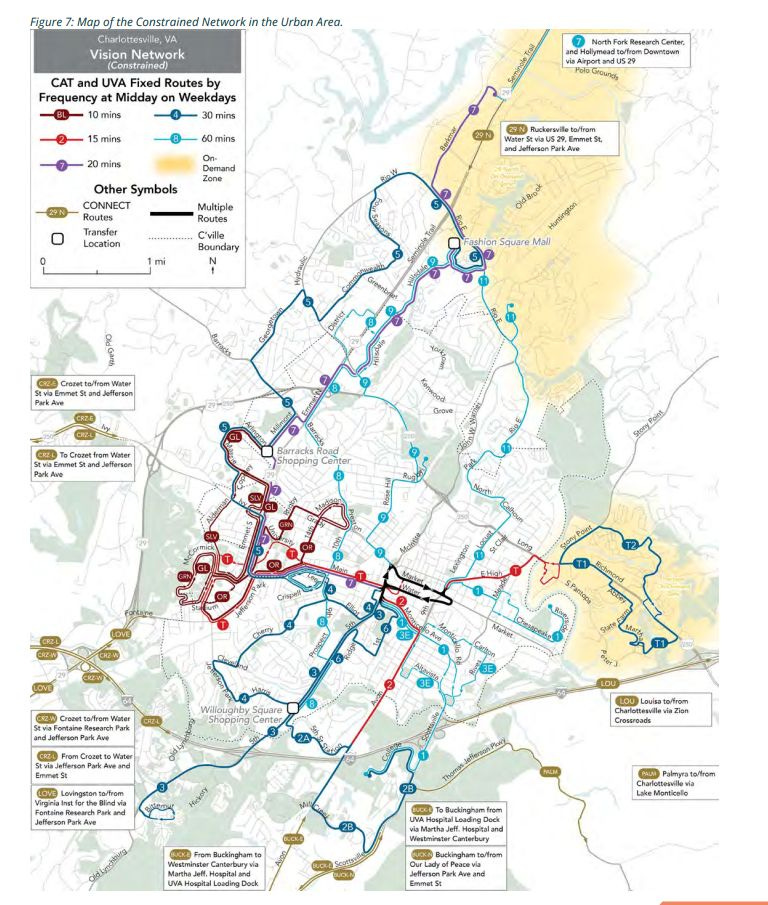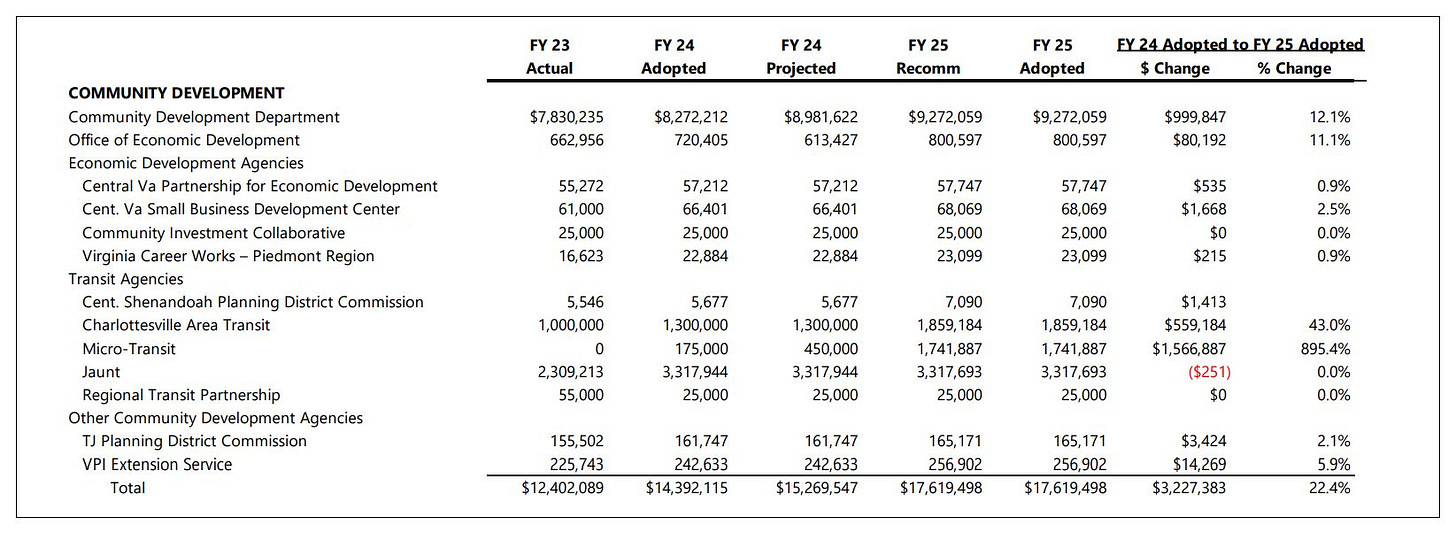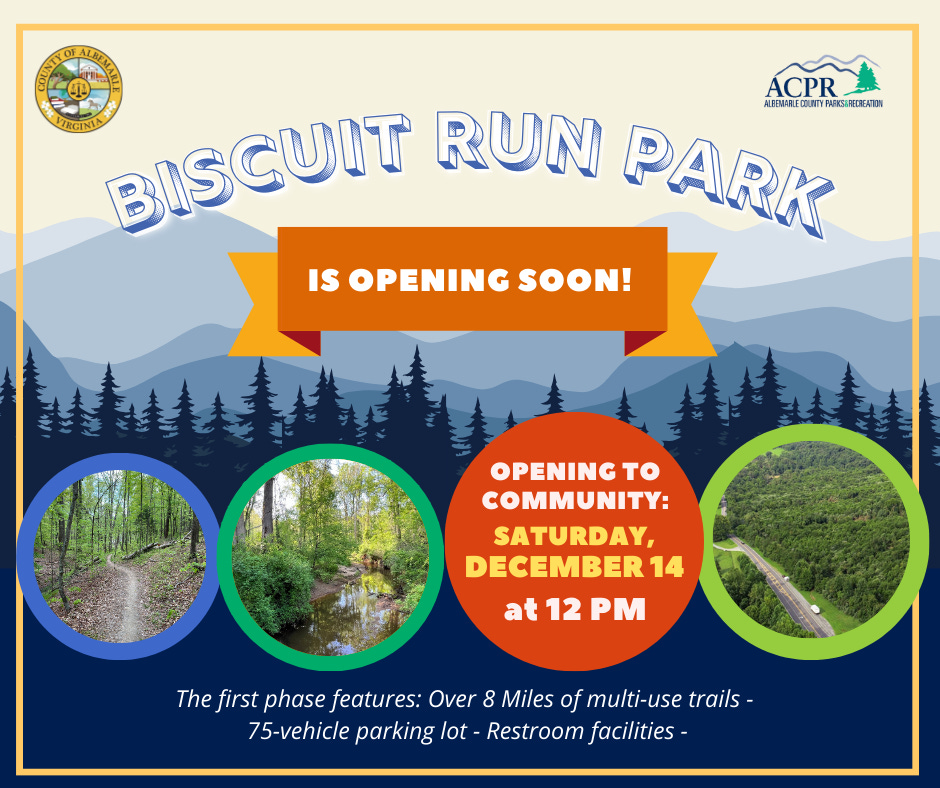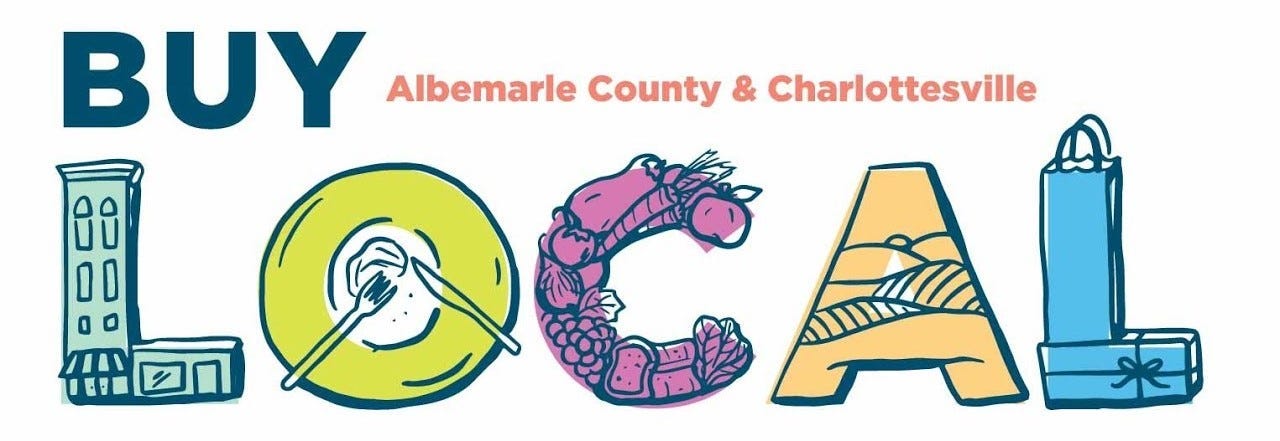December 12, 2024: Albemarle Supervisors unanimously agree to join the Regional Transit Authority
Plus: The first phase of Albemarle’s Biscuit Run Park opens on Saturday
Today is a rare day where the American method of numerically dating the calendar will match the way other countries across the world do so. For it is 12/12/24, or December 12, 2024. This is Charlottesville Community Engagement for this particular day. I’m Sean Tubbs, and I’m grateful for the eleven days a year where this sort of thing occurs.
In today’s installment:
The Albemarle Board of Supervisors agrees to join the Charlottesville-Albemarle Regional Transit Authority
The City of Charlottesville cancels an audit of Jaunt due to missing language in the November 1 request for proposals
Albemarle County will open Biscuit Run to the public on Saturday at noon
The Nelson County Board of Supervisors hears from a Lovingston couple concerned about the noise from recently installed rumble strips on U.S. 29 near a dangerous intersection
First-shout: Magic on the Mall continues!
In today’s first shout-out, the winter holidays are here and Friends of Downtown Cville want you to come and experience Magic on the Mall now through January 7. They’ve invested in a new light display that shows off the mall, and there are events like the Peppermint Trail, Elves in Cville, the Downtown Express, plus a host of new activities. You can see all of the details online at friendsofcville.org/magic!
The group is also looking for people to help with Magic on the Mall. They are looking for volunteers to help run the Downtown Express as well as pass out Elves in Cville booklets and stamps, and Peppermint Trail brochures.
Albemarle Supervisors vote to join Regional Transit Authority
After over 15 years of discussion, the Albemarle Board of Supervisors has voted to join a regional transit authority, a first step toward the county having more of a say in the future of public transportation.
Their action completes work that began in the late 2000’s that included a bill in the General Assembly that allowed such an entity to be created.
“In 2024, the Transit Governance Study was completed and recommended that the Regent initiate the formation of the transit authority envisioned in the 2009 legislation,” said Ann Wall, one of Albemarle’s two deputy county executives.
The following paragraph was corrected after publication. See the comment for an explanation.
The creation of the authority does not mean that the body will be providing direct oversight of Charlottesville Area Transit or any other area transit agency. The idea is that the authority can begin to find new sources of revenue to implement a Regional Transit Vision adopted by the Thomas Jefferson Planning District Commission in late 2022. (read that report)

Wall has been working with Charlottesville’s transportation planning manager on the creation of by-laws to govern the work of the authority which will go by the acronym CARTA.
“The intention would be that a CARTA or a transit authority would serve as a collaborative, multi-jurisdictional entity for identifying and solving transit issues,” Wall said. “The Authority would provide long range transit planning services to the region, could recommend transit priorities, advocate for transit needs to the state and federal partners, apply for grants and other kinds of funding, and could serve in the future as a vehicle for administering, potentially for administering and potentially collected dedicated regional transit funding.”
The authority will replace the work that the Regional Transit Partnership is doing and the first year will be about getting CARTA off the ground. As with the partnership, there would be two members of City Council and two members of the Board of Supervisors.
“It will have to start preparing its own budget and figuring out how it pays for some of this planning work and some of this engagement with our community,” said Ben Chambers, Charlottesville’s transportation planning manager.
The authority will be staffed by city and county personnel at first but Chambers said it may one day have its own employees working on the plan. One of the first big policy issues will be updating the 2009 legislation.
“The aim has always been to get us to having a regional transit authority so we have a table to sit down and have these discussions, “Chamber said. “The existing legislation gives us the fundamentals to actually go ahead and just do it.”
Charlottesville City Council will vote on whether to join the authority at their meeting on December 18.
Supervisor Diantha McKeel of the Jack Jouett District is the current chair of the Regional Transit Partnership and has been on that appointed body since 2017.
“We cannot in this locality continue to pay for transit out of our operational funds,” McKeel said. “This gives us a structure and the funding that would be possible to have a robust transit system.”
Albemarle currently contributes to multiple agencies including $7,090 in the current fiscal year to the Central Shenandoah Planning District Commission for the Afton Express. Albemarle also increased its contribution to Charlottesville Area Transit from $1.3 million in FY2024 to $1.86 million in FY2025. That does not include the $1.741 million paid to CAT for the MicroCAT microtransit pilot. Another $3.317 is going to Jaunt this fiscal year.

Other localities in the Thomas Jefferson Planning District are being asked to consider joining the locality in the future. Supervisor Michael Pruitt of the Scottsville District said whether they join may be a factor in the success of making transit that can work to assist with economic development efforts such as at Rivanna Station.
“It is also going to be like so important for our own economic development when it is so much easier to get like Nellysford and Stanardsville and Palmyra bodies to these amazing new economic facilities that we're in the process of putting all this energy and frankly spending into,” Pruitt said.
Supervisor Ann Mallek of the White Hall District had just been elected to office when planning work to form the authority were going on in 2008.
“I'm anxiously keeping my fingers crossed that there will be a bigger partner who will join us coming forward on this to change those numbers and allow us to get so much more federal dollars down when we can actually count all the people instead of just some of the people,” Mallek said.
The University of Virginia is not joining the authority at this time and plans to maintain a separate bus system that only focuses on the immediate area around their campus.
One of the first pieces of business to come back before the board in January will be an application for a planning grant from the Virginia Department of Rail and Public Transportation.
County Executive Jeffrey Richardson took the opportunity to thank the City of Charlottesville for funding two trips earlier this year to Champaign-Urbana, Illinois, to see how a single transit operates for two cities and the University of Illinois. They also got to see how the Mass Transit District creates its own hydrogen fuel.
“When you go and you see seamless transit, when you go and you see alternative fuel and how it's been implemented, and you see systems in place, and you see communities that have similarities to our communities, none of that we would have got to do without the City of Charlottesville,” Richardson said.
Richardson said representatives from the University of Virginia also took part in the second trip in October.
Paid subscribers of this newsletter funded my journey on the first trip to keep an eye on the first delegation in May. If you’ve not read or heard the report, take a look or a listen here.
Charlottesville cancels RFP for audit of Jaunt
In early November, the City of Charlottesville issued a request for firms to perform an audit of Jaunt. Today they’ve canceled that action because the wording in the solicitation may not have complied with federal procurement rules.
“Specifically, the City needs to include the necessary Federal Transit Administration clauses associated with federal grant funding,” reads the announcement sent out through the city’s procurement system.
Bids had been due on December 1 and the city had hoped to have the audit ready in March 2025.
The federal Americans with Disabilities Act of 1990 requires any agency that provides a fixed-route bus system must also provide a paratransit service which means individualized trips to help people in need get around the community.
“Jaunt’s paratransit service provides door-to-door transportation services for customers whose disabilities prevent them from using CAT’s fixed-route service,” reads the background of original the RFP.
People who are within three quarters of a mile of a bus stop are eligible for rides. Jaunt has both a reservations system where people can book rides two weeks in advance as well as subscription service to allow for regular pick-ups.
Jaunt is a public service corporation founded in 1975 and owned by the local governments that fund the agency. Its Board of Directors are appointed by the other localities that hire the company for public transportation services.
Charlottesville is contributing $1,933,090 to Jaunt in the fiscal year that began on July 1, with much of that being a pass-through of federal funds the city receives each year to ensure the ADA-requires service is provided.
Today’s meeting of the Regional Transit Partnership will include a presentation from Jaunt on a recent study of rural transit needs. Learn more about that in yesterday’s newsletter.
(Some of the material in this article is reprinted from the November 5, 2024 edition of the newsletter)
Biscuit Run park opening on Saturday
Fifteen years ago, then Governor Tim Kaine presided over a plan to buy 1,200 acres of land in Albemarle’s southern growth area in order to eventually open a state park. This Saturday, Albemarle County will finally open the first phase of a park run by the locality.
“This nearly 1,200-acre park, located just minutes outside of Charlottesville in Albemarle County, offers access to extensive natural areas and scenic landscapes,” writes Abbey Stumpf, Albemarle’s director of communications and public engagement. “This first phase includes over 8 miles of multi-use trails, a trailhead with 75 parking spaces, and public restrooms, providing a welcoming space for outdoor recreation.”
What is happening is very different from what Albemarle Supervisors had expected in September 2007 when they voted to rezone about a third of the land for what would have been hundreds of homes as well as non-residential space.
Developer Hunter Craig had purchased the land known as Biscuit Run in 2006 for $46.2 million and opted to sell the land to the state in late 2009 for $9.8 million as well as a series of tax credits worth $12.48 million. Charlottesville Tomorrow broke the story back then if you want to go back and read how the information was presented at the time.
The idea had been for the Virginia Department of Conservation and Recreation to program the park and the government agency led the effort to create a master plan that ended up having a $42 million price tag. Funding to pay for the project did not make it out of a General Assembly committee in 2016 and that led efforts to convert the project to a local one instead.
By the fall of 2017, the likelihood of state funding remained low and DCR sought a way to convert it to a regional park. Charlottesville Tomorrow broke that story, too. Albemarle County signed a ground-lease with DCR in 2018.
Many steps have been taken including since then including a rezoning five years ago that returned the land back to parkland as reported in the Charlottesville Daily Progress (paywall).
Albemarle County began work clearing the property for phase 1 in March 2023 hoping for an opening that fall, as reported in this newsletter. There were delays and that opening was pushed back to fall of 2024.
Now at last the public will have a chance to officially use the space beginning this Saturday when the park officially opens at noon.
Sponsored message: Buy Local
Buying locally supports our neighbors and community members and makes a big impact for our local economy. Local businesses are more likely to reinvest in our community and their goods and services contribute to the unique character of our community.
Learn more about how you can support local business at ShowLocalLove.org and on social media:
Nelson County public comment shows complex nature of transportation safety
At this Tuesday’s meeting of the Nelson County Board of Supervisors, a Lovingston resident appeared before the elected officials to ask for help in dealing with an outcome of recent work by the Virginia Department of Transportation near the intersection of U.S. 29, Callohill Drive, and Front Street.
“We live right behind the Front Street garage and on November, I think it was the 18th, on a Monday in the evening, VDOT installed rumble strips,” said Bren Seed. “And we woke up probably 4 in the morning hearing them.”
Seed said the solution to the problem should be lowering the speed on U.S. 29 rather than install a device which kept her and several neighbors for weeks because of the low-frequency rumble.
“They did come take them out, and that was exciting,” Seed said. “The next day they came and put modified ones down so we can sleep now, which is great, but we still hear them all through town and in our yard, and I don't see them slowing traffic down at all.”
Seed’s comments came immediately before a regularly scheduled presentation from VDOT engineer Robert Brown who said the first set of rumble strips had been installed incorrectly by a contractor. He said the previous ones had lost their effectiveness. He said he could investigate other solutions, but these are intended to address safety concerns with the highway.
“They are part of the safety improvements that we want on Route 29,” Brown said. “As you all know, we had a tremendous meeting with the public about safety on the Route 29 corridor. And these are a safety feature.”
Brown said he respected how the sounds would be terrible to someone who lived nearby but VDOT needs to see how they perform. The speed limit on U.S. 29 through Lovingston is at 45 miles per hour and the rumble strips are intended to remind people they are traveling too fast.
“We all know how traffic drives through that intersection,” Brown said. “Just because it says it's 45 miles per hour doesn't mean that people aren't running 60.”
Brown said an additional traffic study is still in the works about extending the 45 miles per hour zone.
East District Supervisor Jesse Rutherford said that safety of that intersection is a priority.
“We all know someone who has unfortunately died in that intersection,” Rutherford said. “And I can name multiple individuals in my life who have died in that intersection.”
Rutherford said the county will continue to work on getting more traffic enforcement from the Virginia State Police or the Sheriff’s Department. He said the Board would like to work toward less intrusive options that affect the quality of life of people who live in Lovingston.
Third shout-out: Free screening this Saturday of It’s a Wonderful Life
In today’s bonus third-shout out that has absolutely no one paying for it: Scottsville’s Center for the Arts and the Natural Environment will be showing a free matinee of It’s a Wonderful Life this Sunday afternoon at Victory Hall at 401 Valley Street in Scottsville. The 1946 Frank Capra film starring Jimmy Stewart and Donna Reed is one of the most influential pieces of artwork in my life, and seeing it in a theater would be quite amazing.
Participants may also consider dressing in 1940’s period clothing as they enjoy the show? Enjoy a soda pop, some popcorn, maybe some swell candy? SCAN looks forward to having you there, and they suggest it’s gonna be a humdinger!
Reading material for #779:
Duner’s teams up with food bank to honor late Wilson Richey, Amaya Mitchell, WVIR 29NBC, December 10, 2024
Decivilization May Already Be Under Way, Adrienne LaFrance, The Atlantic (paywall), December 12, 2024 (commentary)
9 states, including Virginia, poised to end coverage for millions if Trump cuts Medicaid funding, Paul Galewitz, Virginia Mercury, December 11, 2024
Report confirms: Data centers in Virginia pose enormous power demands. Whitney Pipkin, Bay Journal, December 11, 2024Rules for solar on Virginia prime agricultural, forest land being considered, Charlie Paullin, Virginia Mercury, December 12, 2024
#779 was fine but also finite
There is a story that’s missing from the reading material above that didn’t make this edition because I still have some questions out there that will hopefully result in more reporting. There’s another story that didn’t happen because one of my computers reset in the night before I saved the audio file.
But this is now the fourth regular newsletter this week and the fifth if you count the Week Ahead. The introduction for tomorrow is already written and I plan to work well into the evening on some of the stories for that. There’s a lot to get to, and paid subscribers expect me to keep working!
At the same time, my slow cooker today is currently generating tonight’s meal, and the ingredients for tomorrow’s meal are in my fridge. For those concerned that I appear to work too much, please know that there’s plenty of life that comes with taking control of the food I eat.
Every day I wake up and think how I can do this work more effectively. I’m always looking for ways to improve because I feel an obligation to hold up my end of the bargain that comes when people pay me to do the work. I’m so grateful and hope to be doing this for a long time to come.
If you’d like to support, here are some options:
You can get a paid subscription here through Substack. This is the easiest way, and you can turn off auto-pay if you have concerns about that. If you pay this way, Ting will match your initial payment but this is only valid up to December 31.
You can sign up through Patreon for a monthly contribution which may give you a benefit depending on the tier. Until December 31, anyone who signs up at $25 a month gets a shout-out in this newsletter!
You can be like one person this week who sent a check to PO Box 1754, Charlottesville, VA, 22902. Many people like this option because it keeps their financial information out of Substack. It is not tax-deductible, however, but I’m working on that, too.
You can consider advertising. In 2025, I will have more clear options for businesses who want to take advantage of the growing audience.
You can create a piece of artwork! Especially if you’re a graphic designer and would like to help me create some decent logos!
But back to Ting and Substack.
If you sign up for service and you are within Ting’s service area, enter the promo code COMMUNITY you’re going to get:
Free installation
A second month for free
A $75 gift card to the Downtown Mall









This edition originally had a classic Sean Tubbs error in the Regional Transit Authority section.
The original sentence was:
"The creation of the authority does mean that the body will be providing direct oversight of Charlottesville Area Transit or any other area transit agency."
What's missing is a NOT between does and mean. This is one of my most recurring blunders, omitting helper words that are crucial to understanding the meaning of a sentence. A copy editor would pick that up, and a copy editor I hope to put in place as soon as possible. I believe I am close to this.
The immediate concern is how I will pay someone and if there is enough revenue to cover that. This is a small business after all, and so I am working to try to figure that out. As more people read this work, it is crucial little mistakes are ironed out because those little mistakes cost the credibility.
I am grateful for the reader who pointed this out, and I will work harder to fix this weakness in the current production mechanism.